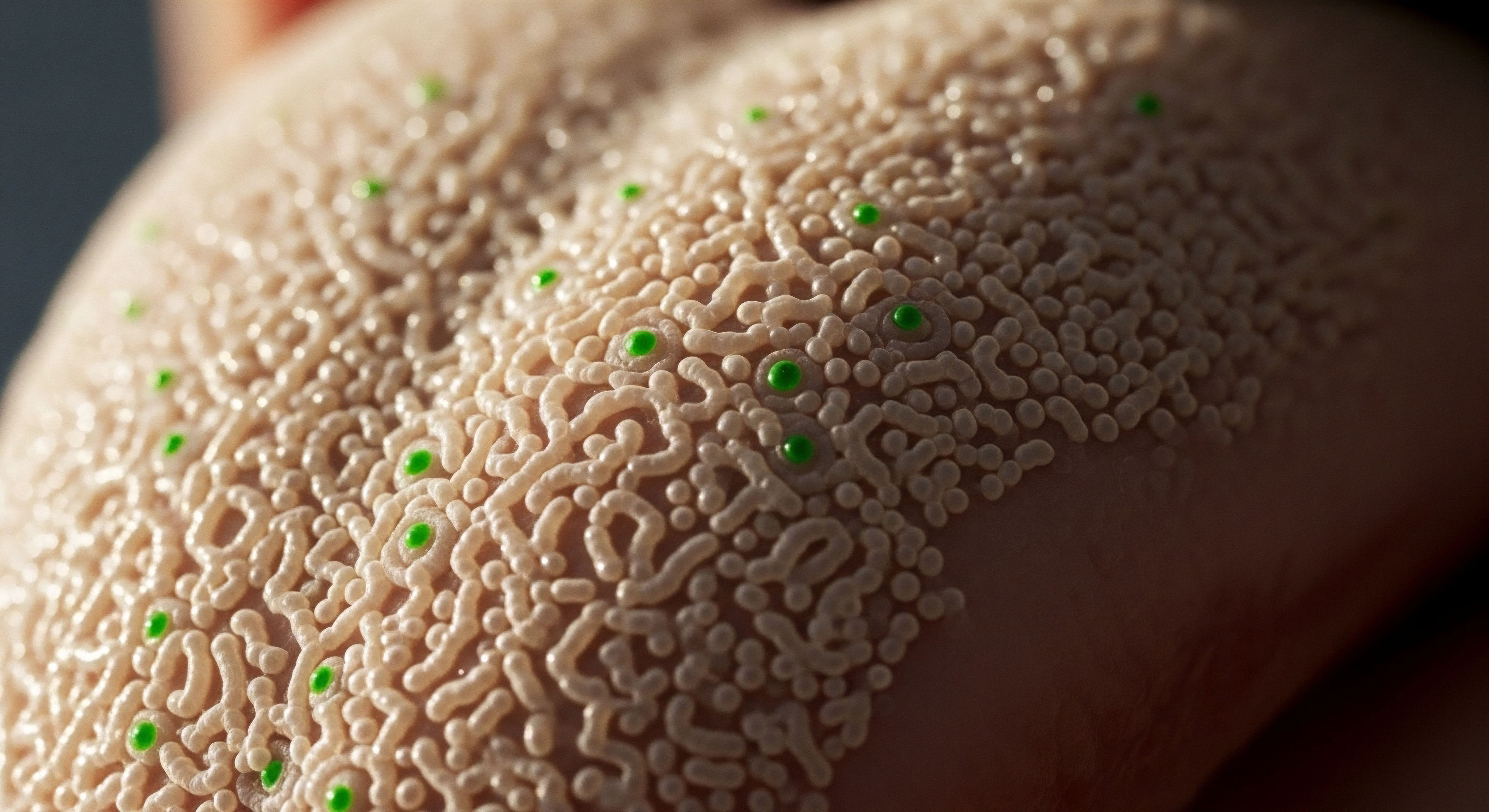

The Biological Clock’s Prime Directive
Sleep is the fundamental operating system update for your entire biological architecture. It is the bedrock upon which peak performance, enduring vitality, and deep health are built. To approach sleep as mere rest is to misunderstand its active, intricate role in recalibrating every system within the body.
This nightly protocol is where cellular regeneration occurs, where hormonal balances are reset, and where cognitive architecture is reinforced. Without its precise execution, the machinery of life falters, leading to a cascade of suboptimal outcomes across metabolic, immune, and neurological functions. Understanding this directive is the first step in reclaiming your biological birthright.
At its core, sleep is the body’s primary mechanism for repair and restoration. During deep sleep stages, cellular damage is mended, tissues are rebuilt, and energy stores are replenished. This process is an imperative for maintaining functional integrity. Hormonal regulation is profoundly influenced by sleep.
Growth hormone, vital for muscle repair and tissue regeneration, is primarily released during slow-wave sleep. Cortisol, the stress hormone, follows a diurnal rhythm that is heavily dictated by sleep patterns, with optimal levels being low in the evening and rising in the morning to prepare you for wakefulness. Disruptions to this rhythm can lead to chronically elevated cortisol, contributing to impaired immunity, increased fat storage, and cognitive fog.
Furthermore, sleep is the crucible for cognitive function. Memory consolidation, learning, and synaptic plasticity ∞ the brain’s capacity to form new neural connections ∞ occur predominantly during sleep. REM sleep, in particular, is vital for processing emotional information and solidifying procedural memories. When sleep is insufficient or fragmented, these vital functions degrade, impacting focus, decision-making, and emotional regulation. The consequence is a diminished capacity to operate at your highest potential, both intellectually and emotionally.
Metabolically, sleep acts as a master regulator. It influences insulin sensitivity, glucose metabolism, and appetite-controlling hormones like ghrelin and leptin. Chronic sleep deprivation is directly linked to increased insulin resistance, a precursor to type 2 diabetes, and can lead to dysregulation of hunger signals, promoting overeating and weight gain.
This interconnectedness underscores why sleep is not an optional add-on to a health regimen but a non-negotiable foundation. It is the silent architect that builds resilience, sharpens intellect, and fortifies the body’s defense systems, preparing you to meet each day with unparalleled vigor.


Engineering Nightly Renewal
Mastering sleep requires a systematic, engineering approach ∞ understanding the mechanisms and then meticulously applying protocols to refine them. This is about actively orchestrating your internal biological systems to achieve a state of deep restorative rest. The journey begins with aligning your circadian rhythm, the internal 24-hour clock that governs sleep-wake cycles, hormone release, and other physiological processes. This alignment is primarily influenced by light exposure, meal timing, and consistent activity patterns.
The architecture of sleep itself comprises distinct stages, each serving a unique purpose. Non-Rapid Eye Movement (NREM) sleep, particularly deep NREM sleep, is the primary phase for physical restoration, cellular repair, and the release of growth hormone. Rapid Eye Movement (REM) sleep is vital for cognitive functions, including memory consolidation, emotional processing, and learning. A balanced sleep architecture, characterized by sufficient time in both NREM and REM stages, is the hallmark of effective bio-recalibration.

Core Pillars of Sleep Engineering

1. Circadian Rhythm Synchronization
Your circadian rhythm is your body’s internal conductor, dictating the timing of sleep and wakefulness. Its primary driver is light.
- Morning Light Exposure: Upon waking, seek bright, natural light within the first hour. This signals to your suprachiasmatic nucleus (SCN) in the hypothalamus that the day has begun, suppressing melatonin production and initiating the wakefulness cascade. Aim for at least 10-30 minutes of direct sunlight or equivalent bright artificial light.
- Evening Light Management: As daylight wanes, minimize exposure to artificial light, especially blue light emitted from screens. Blue light wavelengths are potent suppressors of melatonin, the hormone that signals sleep. Utilize blue-light filtering glasses, engage night-shift modes on devices, and create a dimly lit environment in the hours leading up to bedtime.

2. Environmental Optimization
Your sleep environment must be a sanctuary of restoration, free from disruptive stimuli.
- Temperature: A slightly cooler room temperature, typically between 60-67°F (15-19°C), aids the natural drop in core body temperature that precedes and accompanies sleep onset.
- Darkness: Absolute darkness is paramount. Even minimal light can interfere with melatonin production and sleep quality. Use blackout curtains, cover any electronic indicator lights, and consider an eye mask if necessary.
- Sound: While silence is ideal, consistent, low-level white noise or pink noise can mask disruptive external sounds and promote a more stable sleep state.

3. Behavioral Consistency and Rituals
The human body thrives on predictability. Establishing consistent sleep-wake patterns and pre-sleep rituals signals to your system that it is time to wind down.
- Consistent Sleep Schedule: Aim to go to bed and wake up around the same time every day, even on weekends. This reinforces your natural circadian rhythm and improves sleep efficiency.
- Pre-Sleep Routine: Develop a calming ritual in the 60-90 minutes before bed. This might include reading a physical book, gentle stretching, meditation, or taking a warm bath. Avoid stimulating activities, work-related tasks, or emotionally charged conversations.
- Mindful Consumption: Avoid caffeine for at least 8-10 hours before bed and alcohol within 3-4 hours. Heavy meals close to bedtime can also disrupt sleep.

4. Strategic Physical and Mental Engagement
Your daytime activities profoundly influence your nighttime recovery.
- Exercise Timing: Regular physical activity enhances sleep quality, but intense exercise too close to bedtime can be stimulating. Aim for moderate to vigorous workouts earlier in the day, with lighter activities like yoga or stretching suitable for the evening.
- Stress Management: Chronic stress elevates cortisol, directly interfering with sleep. Incorporate stress-reducing practices like mindfulness, deep breathing exercises, or journaling into your daily routine.
The precise release of Growth Hormone during slow-wave sleep drives significant cellular repair and tissue regeneration, a vital process often underestimated in daily performance metrics.


Synchronizing with Your Biological Rhythm
The “when” of sleep is as vital as the “what” and “how.” It is about synchronizing your sleep protocols with your innate biological rhythms to maximize restorative benefits and performance output. This involves understanding the concept of sleep debt, respecting your chronotype, and recognizing that sleep is not a commodity to be stockpiled but a continuous, essential biological function.
Your body operates on a 24-hour cycle, the circadian rhythm, which is influenced by external cues, primarily light. Aligning your sleep and wake times with this rhythm is foundational. Waking with the sun and winding down as it sets creates a natural cascade of hormonal signals that refine sleep onset and quality.
Morning light exposure, as detailed previously, anchors this rhythm, signaling to your brain that it is time to be alert and metabolically active. Conversely, dimming lights in the evening supports the natural rise of melatonin, preparing your body for rest.
The concept of sleep debt requires precise understanding. It represents a cumulative disruption to intricate biological processes that occur during specific sleep stages. While an occasional late night may not cause lasting damage if followed by prompt recovery, chronic sleep deprivation creates a cumulative debt that impairs cognitive function, hormonal balance, and metabolic health. This persistent deficit diminishes your capacity for high-level performance and increases your susceptibility to illness.
Understanding your chronotype ∞ whether you are an early bird, a night owl, or somewhere in between ∞ can help you tailor your sleep schedule for optimal alignment. While external factors and consistent routines can shift chronotype tendencies, working with your natural inclination, rather than against it, can lead to greater sleep efficiency and daytime alertness.
For instance, an individual with a strong morning chronotype will likely benefit from earlier bedtime and wake times, while a pronounced evening chronotype might find later schedules more conducive, provided they still achieve adequate duration and quality.
The timing of sleep directly impacts hormonal release patterns. Growth hormone peaks during deep sleep, vital for overnight repair. Cortisol levels naturally decline throughout the day, reaching their lowest point in the early part of sleep, and then begin to rise pre-dawn to facilitate waking. Disrupting this cycle through inconsistent sleep schedules or late-night light exposure can blunt the morning cortisol rise, leading to daytime fatigue, or elevate evening cortisol, hindering sleep onset.
Integrating sleep refinement into your life is a strategic decision. It requires viewing sleep not as a passive downtime but as an active, performance-enhancing protocol. This means prioritizing consistent sleep duration and quality over short-term gains that compromise nightly recovery. The cumulative effect of disciplined sleep timing and quality builds resilience, sharpens mental acuity, and fortifies your biological systems, ensuring you operate at your highest capacity day after day.
Chronic sleep deprivation creates a cumulative debt that impairs cognitive function, hormonal balance, and metabolic health, diminishing your capacity for high-level performance.

Mastery Begins When You Close Your Eyes
The protocol for sleep is a fundamental recalibration of your biological operating system. It is the intelligent architect’s plan for peak existence, where nightly restoration fuels daytime ascendancy. By understanding the ‘why’ ∞ the intricate biological imperatives of repair, regulation, and resilience ∞ and mastering the ‘how’ ∞ the precise engineering of your environment and behaviors ∞ you gain control over your most powerful performance asset.
The ‘when’ is the ultimate synchronization, aligning your internal rhythms with the external world to create a state of sustained biological balance. This disciplined approach transforms sleep from a passive necessity into an active strategy for self-mastery.
It is within the quiet hours of deep sleep that the body undertakes its most vital maintenance, clearing cellular debris, consolidating learning, and balancing hormonal systems. This is not about merely surviving; it is about excelling, about accessing the latent capacity that resides within your unique biological architecture.
To accept this protocol is to recognize that true vitality is not an accident but a deliberate construction. It is the result of understanding the deep interplay between sleep, hormones, metabolism, and cognition. By implementing these principles, you are not just improving your sleep; you are upgrading your entire system, positioning yourself at the forefront of personal performance and longevity. The strength to reset, rebuild, and refine lies dormant within your nightly cycle, waiting to be commanded.
Mastery begins not with the dawn’s first light, but with the deliberate intention to surrender to the restorative power of the night. This is the Vitality Architect’s definitive strategy ∞ utilize the night to conquer the day.

Glossary

peak performance

growth hormone

chronic sleep deprivation

circadian rhythm

light exposure

bio-recalibration

cellular repair

chronic sleep deprivation creates

metabolic health




